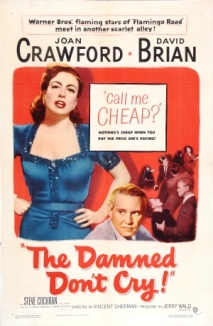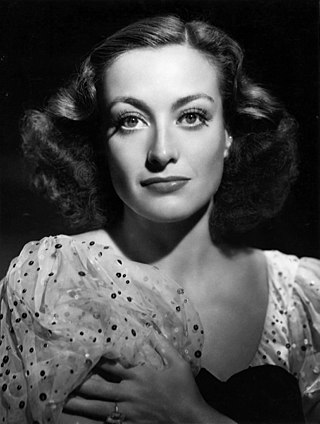
Joan Crawford was an American actress. She started her career as a dancer in traveling theatrical companies before debuting on Broadway. Crawford was signed to a motion picture contract by Metro-Goldwyn-Mayer in 1925. Initially frustrated by the size and quality of her parts, Crawford launched a publicity campaign and built an image as a nationally known flapper by the end of the 1920s. By the 1930s, Crawford's fame rivaled MGM colleagues Norma Shearer and Greta Garbo. Crawford often played hardworking young women who find romance and financial success. These "rags-to-riches" stories were well received by Depression-era audiences and were popular with women. Crawford became one of Hollywood's most prominent movie stars and one of the highest paid women in the United States, but her films began losing money. By the end of the 1930s, she was labeled "box office poison".

Dead Men Don't Wear Plaid is a 1982 American neo-noir mystery comedy film directed, co-written by, and co-starring Carl Reiner and co-written by and starring Steve Martin. Co-starring Rachel Ward, the film is both a parody of and a homage to film noir and the pulp detective films of the 1940s. The title refers to Martin's character telling a story about a woman obsessed with plaid in a scene that was ultimately cut from the film.

Jerome Irving Wald was an American screenwriter and a producer of films and radio programs.
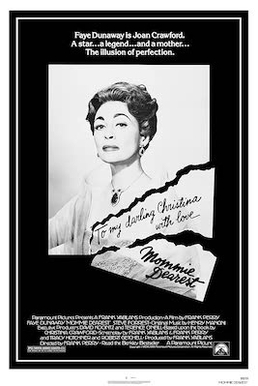
Mommie Dearest is a 1981 American biographical psychological drama film directed by Frank Perry and starring Faye Dunaway, Steve Forrest, Mara Hobel, and Diana Scarwid, with supporting performances from Xander Berkeley in his feature film debut along with Rutanya Alda and Jocelyn Brando. Adapted from Christina Crawford's 1978 autobiography of the same name, the film follows her and her brother Christopher's upbringing under their adoptive mother, actress Joan Crawford, depicting her as abusive, controlling, and manipulative, prioritizing her Hollywood career over her family.
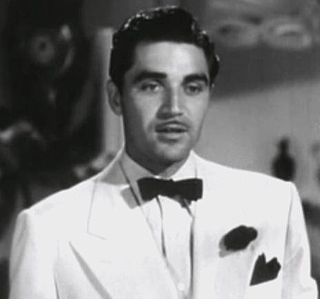
Steve Cochran was an American film, television and stage actor. He attended the University of Wyoming. After a stint working as a cowboy, Cochran developed his acting skills in local theatre and gradually progressed to Broadway, film and television.

Nora Prentiss is a 1947 American film noir directed by Vincent Sherman and starring Ann Sheridan, Kent Smith, Bruce Bennett, and Robert Alda. It was produced and distributed by Warner Bros. The cinematography is by James Wong Howe and the music was composed by Franz Waxman. The film's sets were designed by the art director Anton Grot.
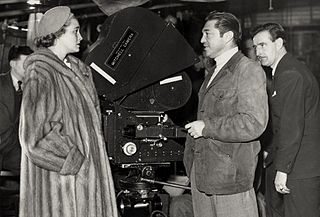
Vincent Sherman was an American director and actor who worked in Hollywood. His movies include Mr. Skeffington (1944), Nora Prentiss (1947), and The Young Philadelphians (1959).

"The Damned Don't Cry" is a song by British synth-pop group Visage, released as a single by Polydor Records in 1982.

Brian James Davis, better known as David Brian, was an American actor. He is best known for his role in Intruder in the Dust (1949), for which he received critical acclaim and a Golden Globe nomination. Brian's other notable film roles were in The Damned Don't Cry (1950), This Woman Is Dangerous (1952), Springfield Rifle (1952), Dawn at Socorro (1954), and The High and the Mighty (1954).

The Joan Crawford filmography lists the film appearances of American actress Joan Crawford, who starred in numerous feature films throughout a lengthy career that spanned nearly five decades.
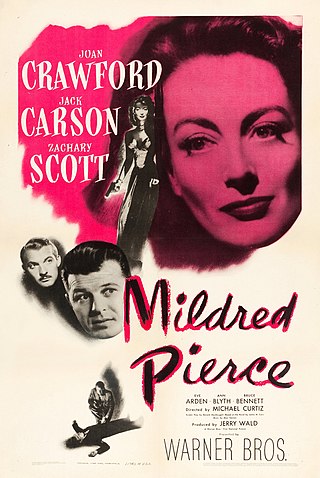
Mildred Pierce is a 1945 American melodrama/film noir directed by Michael Curtiz and starring Joan Crawford, Jack Carson, and Zachary Scott, also featuring Eve Arden, Ann Blyth, and Bruce Bennett. Based on the 1941 novel by James M. Cain, this was Crawford's first starring role for Warner Bros., after leaving Metro-Goldwyn-Mayer, and she won the Academy Award for Best Actress. In 1996, Mildred Pierce was deemed "culturally, historically, or aesthetically significant" and selected for preservation in the United States Library of Congress National Film Registry.

Don Grady was an American actor and musician. He was best known as one of the Mouseketeers on the Mickey Mouse Club, and as Robbie Douglas on the long-running ABC / CBS television series My Three Sons. During his short-lived career in music he was a solo singer and the drummer for the pop band The Yellow Balloon.

Harriet Craig is a 1950 American drama film starring Joan Crawford. The screenplay by Anne Froelick and James Gunn was based upon the Pulitzer Prize-winning 1925 play Craig's Wife, by George Kelly. The film was directed by Vincent Sherman, produced by William Dozier, and distributed by Columbia Pictures. Harriet Craig is the second of three cinematic collaborations between Sherman and Crawford, the others being The Damned Don't Cry (1950) and Goodbye, My Fancy (1951).

Goodbye, My Fancy is a 1951 American romantic comedy film starring Joan Crawford, Robert Young, and Frank Lovejoy. The film was directed by Vincent Sherman and produced by Henry Blanke. Distributed by Warner Bros., the film was based on the 1948 play of same name by Fay Kanin and adapted for the screen by Ivan Goff and Ben Roberts. Reinforcing social changes brought on by World War II and movies portraying women as successful on their own, such as 1945's Academy Award-winning Mildred Pierce, the plot follows an influential Congresswoman who returns to her former college to receive an honorary degree only to find her old flame as the university president.

The Champ is a 1979 American neo noir drama sports film directed by Franco Zeffirelli and a remake of the 1931 Academy Award-winning film of the same name directed by King Vidor. It stars Jon Voight as Billy Flynn, a former boxer who attempts to support his son and reconcile with his ex-wife by fighting in the ring again.

Born to Be Bad is a 1950 American film noir melodrama directed by Nicholas Ray and starring Joan Fontaine, Robert Ryan and Zachary Scott. It features Fontaine as a manipulative young woman who will stop at nothing to get what she wants. It is based on the bestselling novel All Kneeling by Anne Parrish (1928).

The One and Only is a 1978 comedy film starring Henry Winkler, directed by Carl Reiner and written by Steve Gordon.
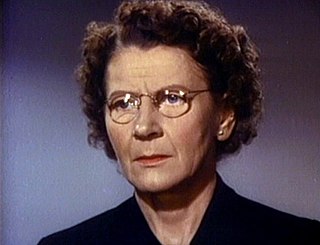
Edith Evanson was an American character actress of film, stage and television during the Golden Age of Hollywood.

The Wife is a 2017 drama film directed by Björn L. Runge and written by Jane Anderson, based on the 2003 novel of the same name by Meg Wolitzer. It stars Glenn Close, Jonathan Pryce, and Christian Slater, and follows a woman (Close) who questions her life choices as she travels to Stockholm with her husband (Pryce), who is set to receive the Nobel Prize in Literature.
The Damned Don't Cry is a 2022 French-Belgian-Moroccan drama film written and directed by Fyzal Boulifa. It premiered at the 79th edition of the Venice Film Festival, in the Giornate degli Autori sidebar.
